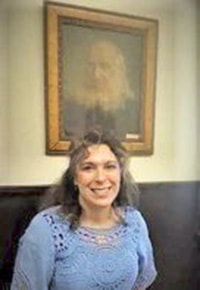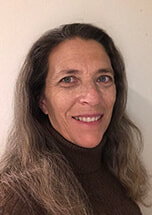 By PASTOR GENA MARIA KOEBERL Danebod Lutheran Church, Tyler, MN I believe in God, the Father Almighty, creator of heaven and earth When we recite the Apostles’ Creed we are joining with Christians across time and space. I remember one day I was visiting a seminary in Northern Tanzania when I heard a classroom reciting the Apostles’ Creed in Swahili. Later I heard it again in the Maasai language at a church service among Maasai villagers. How did I know? There was a rhythm and universal cadence that is across language barriers, that we all share. It’s interesting that this universal creed it is not worded “We believe,” but “I believe.” I believe in God. There is a saving grace to that pronoun because even though this is a universal confession, it is also giving us permission to state our own beliefs. The Creed, called the Apostles’ Creed, is not a production of the apostles themselves, but a brief summary of their teachings. The creed is attributed to the earliest missionary followers of Jesus and provides a basic outline of what it means to be a Christian. It is a short summation of the depth and richness it proclaims. It sets forth a doctrine of what we believe. The first thing we determine for ourselves is whether we believe in God. “I believe in God.” There are a lot of people who never get that far. We have no scientific technique that proves the existence of God nor do we have a foolproof method to determine there is no God. (2004, Anne Roberson) When we recite the words “I believe...” it is not just an intellectual act. The Latin word Credo or “I believe” involves more than our brains. A better translation may be, “I put my trust in.” The Hebrew word for “believe” is “aman” and is the word for the relationship between a foster parent and child. This is a relationship of trust and loving dependence. (2019, Working Preacher, Karl Jacobson) Once we establish that we are putting our trust and love into God, we learn this is a Relator God. God the Father, God the creator of heaven and earth. We’re not talking about an abstract concept, an ethereal spirit hiding in the universe, watching from a distance. We trust a relator, a creator, a parent God. We are part of the Creation God has made, which makes us different from God, and yet God created us as a parent creates a child, which also means we share God’s “DNA.” We are the thumbprint of God. Genesis puts it that we are made in the image of God and later Biblical passages say that we are sons and daughters of God. N.F.S. Grundtvig, a great influencer of the Danish and Danish American Lutheran Churches and of the Folk School movement, believed the living word of God was each human life and how we lived out our humanity in the image of God, as creations of God, carriers of God’s “DNA.” It was through the confessions of belief that we are enabled to understand the biblical word of God, making it a living word through the human experience of God. Grundtvig states his view of humanity as a “divine experiment of dust and spirit.” He said of the Apostles’ Creed, “How did I become a member of the Church? By Holy Baptism. On what condition? On the condition that I should renounce the devil, all his works, all his essence, and believe in the Father, the Son, and the Holy Ghost, as it is set forward in the Apostles’ Creed. Everybody who has this faith, to him the Holy Ghost opens the mysteries of the Holy Scripture, and he can understand them;” He believed that the Apostles’ Creed was key to understanding the New Testament as both were given by the same Holy Spirit. The motto, “Human comes first, and Christian next” is a central expression of Grundtvig’s creation theology. The Danish can also be translated, “Be first a human, and then be a Christian in accordance herewith,” thus pointing to the demand to fulfil our human destiny in faith, hope, and love. His creation theology spoke of humans being the image of God, Imago Dei and also succumbing to the inverted sin of self-centered, or turning in on oneself, Imago Sui; and that human beings are also to be understood from their embeddedness in the created cosmos, as an imago Mundi. We are microcosms of the wider macrocosm, both as sensory and as spiritual beings. That all is interconnected. (Human Comes First: The Christian Theology of N.F.S. Grundtvig, Edward Broadbridge, ed., Aarhus Universitetsforlag, Jul 31, 2018) All this is quite remarkable when you consider it was written in the 19th century and much of our eco-theology awareness did not become prominent until the 1960s, especially in America. One such concept is that of Ecological Sin. Ecological sin is the refusal to act in the image of God, to defy God’s covenant of justice by grasping more than our due, breaking our bond with God and others in creation. It is acting like the owner of creation with absolute property rights. The truth is we are guests invited by the host to participate. When God created, it was a joy. We are called to be co-creators with God. That means no one is unimportant. The ecological crisis of our age is a responsibility for everyone. Everything we do either draws the Kingdom of Love closer or pushes it away. Too often we want to let somebody else do it, the preacher, the teacher, the government agency. The care of earth is part of all our responsibility. Now is when we need to make choices that transcend our self-interests and our political partisans. Sally McFague in her book “Life Abundant: Rethinking Theology and Economy for a Planet in Peril” suggests resisting a culture of limitless consumerism and converting our lives to a philosophy of “enough-ness.” That calls for a different view of abundance and abundant life. Living “enough-ness” claims that housemates here on earth must abide by three main rules: 1. Take only your share; 2. Clean up after yourselves; 3. Keep the house in good repair for future occupants. Today there is a new poor, the earth. Jesus said to a lawyer who asked what can be done to gain eternal life, “Love God, love your neighbor.” Who is my neighbor? Jesus tells the lawyer a story about a man who walks a treacherous road and is beaten and robbed. A priest walks past him. Then a lawyer walks past him. Finally, an outsider, who is the most unlikely person to care, stops and helps. This outsider disregards his own safety and gets off his donkey to go into the ditch, bandage the man’s wounds, and bring him to shelter. Then Jesus asks, “Who is the neighbor?” All respond, “the man who helped.” Jesus says go and do the same. A neighbor in the ditch is one who is in need and may not be the most convenient or comfortable to help. In fact, your neighbor in need may not be a human being. Creation is our neighbor. It is time we take care of the new poor, the earth. We have a responsibility, being created in God’s image, to be a good neighbor to God’s greatest joy, God’s creation. It was timely that we talked about the Apostles’ Creed during the Fall Folk Meeting at Danebod Folk School. There are themes from the folk school tradition of adult, progressive and informal education that fit such a series. Emphasis on fellowship of living and working together, the importance of the “living word,” the stress on common humanity and education as a “living interaction” –– a coming to terms with the meaning of one’s own existence and co-existence. Learning to live, not just make a living. Indeed, everything we know, experience, believe, and imagine is because of God. What we say, do, touch, and think leaves a mark on the earth. You matter. We all matter. We are touched and blessed by the creator of everything and we are God’s greatest joy. And so I end with a bit of wisdom for living out our response to the belief in God our relator, creator God, from the poem “All I Really Need to Know I Learned in Kindergarten” by Robert Fulghum, published in the Kansas City Times, September 17, 1986. Most of what I really need to know about how to live, and what to do and how to be, I learned in kindergarten. Wisdom was not at the top of the graduate school mountain but here on the sandbox at nursery school. These are the things I learned: Share everything. Play fair. Don’t hit people. Put things back where you found them. Clean up your own mess. Don’t take things that aren’t yours. Say you’re sorry when you hurt somebody. Wash your hands before you eat. Flush. Warm cookies and cold milk are good for you. Live a balanced life. Learn some and think some and draw and paint and sing and dance and play and work every day some. Take a nap every afternoon. When you go out into the world, watch for traffic, hold hands, and stick together. Be aware of wonder. Remember the little seed in the plastic cup. The roots go down and the plant goes up and nobody really knows how or why…but we are all like that. Goldfish and hamsters and white mice and even the little seed in the plastic cup –– they all die. So do we. And then remember the book about Dick and Jane and the first word you learned, the biggest word of all: LOOK.Everything you need to know is in there somewhere. The Golden Rule and love and basic sanitation. Ecology and politics and sane living. Think of what a better world it would be if we all –– the whole world –– had cookies and milk about 3 o’clock every afternoon and then lay down with our blankets for a nap. Or if we had a basic policy in our nation and other nations to always put things back where we found them and cleaned up our own messes. And it is still true, no matter how old you are, when you go out into the world, it is best to hold hands and stick together. [email protected]
0 Comments
Leave a Reply. |
Editor InformationBridget Lois Jensen Archives
March 2023
|
Subscribe | Gift |
Submit an Article |
Contact |
© COPYRIGHT 2019 CHURCH AND LIFE.
|

 RSS Feed
RSS Feed